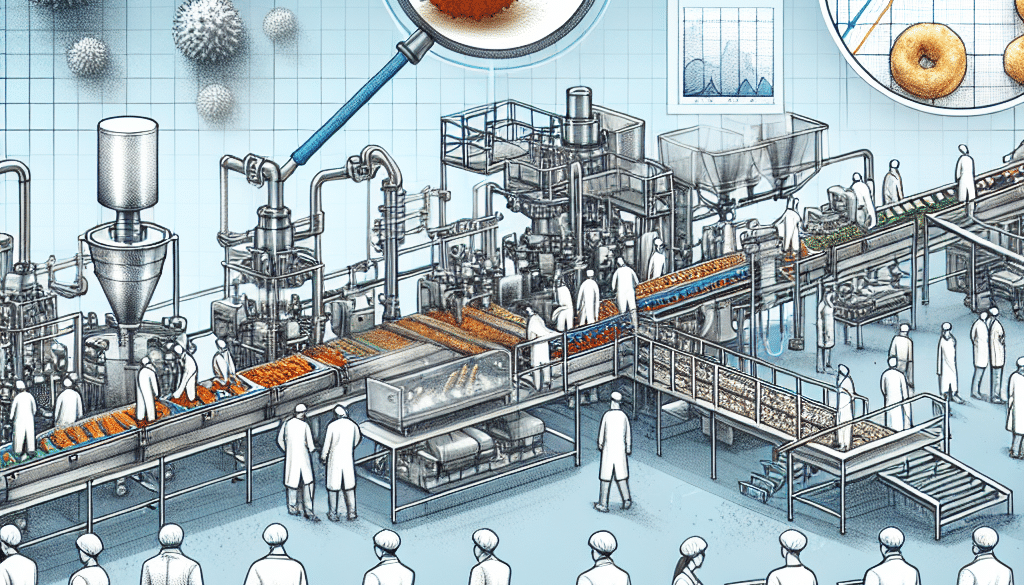Acrylamide Reduction: Innovations in Food Processing
-
Table of Contents
- Acrylamide Reduction in Food Processing: Cutting-Edge Innovations
- Understanding Acrylamide Formation
- Regulatory Measures and Industry Response
- Innovative Strategies for Acrylamide Reduction
- Case Studies and Real-World Examples
- Impact on Health and Consumer Perception
- Challenges and Future Directions
- Conclusion: Embracing Innovation for Safer Food
- ETprotein: Your Partner for High-Quality Protein Products
Acrylamide Reduction in Food Processing: Cutting-Edge Innovations

Acrylamide, a chemical compound that can form in some foods during high-temperature cooking processes, has been a growing concern for food safety regulators and the food industry. The presence of acrylamide in food is linked to potential health risks, including cancer, which has prompted the industry to seek innovative solutions to reduce its formation. This article explores the latest advancements in food processing that aim to minimize acrylamide levels, ensuring safer consumption without compromising on taste or quality.
Understanding Acrylamide Formation
Acrylamide is formed when asparagine, an amino acid, reacts with reducing sugars such as glucose and fructose during high-temperature cooking, such as frying, baking, or roasting. This reaction is part of the Maillard reaction, which is responsible for the browning and flavor development in cooked foods. Foods that are rich in carbohydrates, like potatoes and grains, are particularly susceptible to acrylamide formation.
Regulatory Measures and Industry Response
Given the potential health risks, regulatory bodies worldwide have established guidelines and recommendations to limit acrylamide levels in food products. The food industry has responded by investing in research and development to find effective methods to reduce acrylamide content while maintaining the sensory attributes that consumers expect.
Innovative Strategies for Acrylamide Reduction
Several innovative strategies have been developed to reduce acrylamide formation in food products. These include:
- Raw Material Selection: Choosing raw materials with lower levels of asparagine and reducing sugars can inherently reduce acrylamide potential.
- Asparaginase Enzyme Treatment: The application of the enzyme asparaginase breaks down asparagine before it can form acrylamide during cooking.
- Process Optimization: Modifying cooking times, temperatures, and methods can significantly reduce acrylamide formation without affecting food quality.
- Recipe Adjustments: Altering recipes to include ingredients that can inhibit acrylamide formation or to exclude those that promote it.
- Advanced Technologies: Using novel technologies such as vacuum frying, infrared, and microwave cooking to control the cooking environment and reduce acrylamide levels.
Case Studies and Real-World Examples
Several companies have successfully implemented acrylamide reduction strategies:
- A leading snack manufacturer has adopted the use of asparaginase enzyme across its production lines, resulting in a significant reduction in acrylamide content in their potato chips.
- A European bakery chain revised its baking processes, including lowering oven temperatures and altering baking times, to reduce acrylamide formation in bread and pastries.
- A global fast-food chain introduced a new frying oil blend and optimized cooking protocols to minimize acrylamide levels in their French fries.
Impact on Health and Consumer Perception
Reducing acrylamide levels in food products not only addresses health concerns but also positively influences consumer perception. Consumers are increasingly aware of food safety issues and are more likely to choose brands that prioritize health without compromising on taste or quality.
Challenges and Future Directions
While significant progress has been made, challenges remain in balancing acrylamide reduction with product quality, cost, and scalability. Ongoing research and collaboration between industry, academia, and regulatory bodies are essential to develop new solutions and refine existing ones.
Conclusion: Embracing Innovation for Safer Food
The food industry’s proactive approach to reducing acrylamide levels through innovative food processing techniques demonstrates a commitment to consumer health and safety. By continuing to invest in research and adopt new technologies, the industry can ensure that the food we enjoy is not only delicious but also safer for long-term consumption.
ETprotein: Your Partner for High-Quality Protein Products
In the quest for healthier food options, ETprotein stands out as a leading provider of high-quality protein products. Their extensive range of organic bulk vegan proteins is ideal for food manufacturers looking to enhance the nutritional profile of their products while adhering to non-GMO and allergen-free standards. ETprotein’s offerings, including their L-(+)-Ergothioneine (EGT), are perfect for industries seeking to innovate and improve the healthfulness of their products.
About ETprotein:
ETprotein, a reputable protein and L-(+)-Ergothioneine (EGT) Chinese factory manufacturer and supplier, is renowned for producing, stocking, exporting, and delivering the highest quality organic bulk vegan proteins and L-(+)-Ergothioneine. They include Organic rice protein, clear rice protein, pea protein, clear pea protein, watermelon seed protein, pumpkin seed protein, sunflower seed protein, mung bean protein, peanut protein, and L-(+)-Ergothioneine EGT Pharmaceutical grade, L-(+)-Ergothioneine EGT food grade, L-(+)-Ergothioneine EGT cosmetic grade, L-(+)-Ergothioneine EGT reference grade and L-(+)-Ergothioneine EGT standard. Their offerings, characterized by a neutral taste, non-GMO, allergen-free attributes, with L-(+)-Ergothioneine purity over 98%, 99%, cater to a diverse range of industries. They serve nutraceutical, pharmaceutical, cosmeceutical, veterinary, as well as food and beverage finished product distributors, traders, and manufacturers across Europe, USA, Canada, Australia, Thailand, Japan, Korea, Brazil, and Chile, among others.
ETprotein specialization includes exporting and delivering tailor-made protein powder and finished nutritional supplements. Their extensive product range covers sectors like Food and Beverage, Sports Nutrition, Weight Management, Dietary Supplements, Health and Wellness Products, and Infant Formula, ensuring comprehensive solutions to meet all your protein needs.
As a trusted company by leading global food and beverage brands and Fortune 500 companies, ETprotein reinforces China’s reputation in the global arena. For more information or to sample their products, please contact them and email sales(at)ETprotein.com today.














